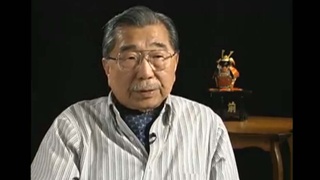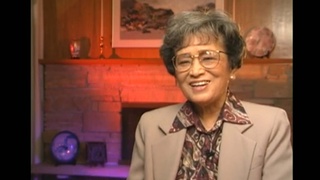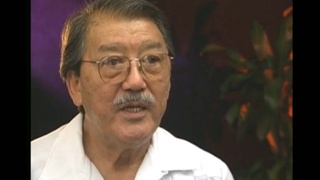Interviews
His testimony has more credibility because of his race
Being assigned to military intelligence gave me some credentials later on to say I was in military intelligence. There’s a certain mystique about that—actual or assumed—[which] nevertheless works in one’s favor.
And the other opportunity, besides meeting Aiko, was to meet other Nisei people with whom we’re still in contact. That helped because then I was able to flush out, to a great extent, the archival kind of material that we were running across. Then, I guess, being able to testify before [Congress], being able to prepare myself to testify with authority, required the knowledge and the skills—most of which were transferred to me from Aiko. With her assistance, I could go before the congressional committees and say with authority, with back-up material, with resources, what I was able to say.
Because I was not Japanese American, there was no doubt about my testimony. But if somebody else [a Nikkei] had said the same thing, if Seiichi Watanabe had [made a similar statement] under the same circumstances, with the same background as mine, it wouldn’t have carried the weight that I was able to present. [My testimony was acceptable] just because of my face [being a Caucasian].
Date: August 26, 1998
Location: Virginia, US
Interviewer: Darcie Iki, Mitchell Maki
Contributed by: Watase Media Arts Center, Japanese American National Museum
Explore More Videos

Father interrogated by FBI, but not taken away
(1925 - 2018) Nisei educator from Hawai‘i

The political effects on Nikkei during the war (Spanish)
(b. 1950) Nisei Chilean, Businessman

Government sold Japanese Canadian properties for little money
(b. 1928) Doctor. Former Chair of the Japanese Canadian Redress Foundation.

The unheralded help from beyond the community
(1917 - 2004) Political activist


Questioning Curfew
(1918-2012) Fought the constitutionality of Executive Order 9066.

Need for Monetary Compensation
(1923–2008) One of the leaders behind the redress movement.

Erasing the Bitterness
(1923–2008) One of the leaders behind the redress movement.



Challenges of finding a summer job
Judge, only Japanese American to serve on CWRIC.

Figuring out a dollar amount for redress
Judge, only Japanese American to serve on CWRIC.

On hearing of CWRIC selection from Senator Inouye
Judge, only Japanese American to serve on CWRIC.

Rationale for rejecting redress payment
Judge, only Japanese American to serve on CWRIC.

